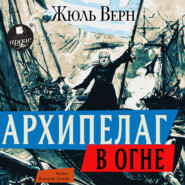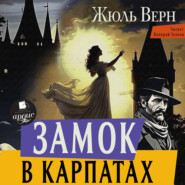По всем вопросам обращайтесь на: info@litportal.ru
(©) 2003-2024.
✖
Дети капитана Гранта / The Children of Captain Grant
Настройки чтения
Размер шрифта
Высота строк
Поля
“Grant!” exclaimed Lord Glenarvan. “That is the adventurous Scotchman that attempted to found a new Scotland on the shores of the Pacific.”
“Yes,” rejoined John Mangles, “it is the very man. He sailed from Glasgow on the Britannia in 1861, and has not been heard of since.”
“There isn’t a doubt of it, not a shadow of doubt,” repeated Lord Glenarvan. “It is just that same Captain Grant. The Britannia left Callao on the 30th of May, and on the 7th of June, a week afterward, it is lost on the coast of Patagonia. You see, friends, we know all now except one thing, and that is the longitude.”
“That is not needed now, we know the country. With the latitude alone, I would engage to go right to the place where the wreck happened.”
And he took up the pen, and dashed off the following lines immediately:
“On the 7th of June, 1862, the three-mast vessel, Britannia, of Glasgow, has sunk on the coast of Patagonia, in the southern hemisphere. Making for the shore, two sailors and Captain Grant are about to land on the continent, where they will be taken prisoners by cruel Indians. They have thrown this document into the sea, in longitude and latitude 37 degrees 11”. Bring them assistance, or they are lost.”
Lord Glenarvan flashed along the electric wire to London to the Times the following words: “For information respecting the fate of the three-mast vessel Britannia, of Glasgow, Captain Grant, apply to Lord Glenarvan, Malcolm Castle[25 - Malcolm Castle – Малкольм-Касл], Dumbartonshire, Scotland.”
Chapter III. The Captain’s Children
Lord Edward Glenarvan’s fortune was enormous, and he spent it entirely in doing good. His kindheartedness was even greater than his generosity.
He was thirty-two years of age, tall, and had stern features; but there was an exceeding sweetness in his look. He was known to be brave. He had scarcely been married three months, and his bride was the daughter of great traveler. Miss Helena did not belong to a noble family, but she was Scotch, and that was better than all nobility in the eyes of Lord Glenarvan; and she was, moreover, a charming, religious young woman.
Lord Glenarvan did not forget that his wife was the daughter of a great traveler, and he had the Duncan built expressly that he might take his bride to the most beautiful lands in the world, and complete their honeymoon by sailing up the Mediterranean.
However, Lord Glenarvan had gone now to London. Lady Helena was too much concerned herself about the lives of the shipwrecked men.
In the evening, when Lady Helena was sitting alone in her room, the house steward[26 - house steward – управляющий] came in and asked if she would see a young girl and boy that wanted to speak to Lord Glenarvan.
“Some of the country people?” asked Lady Helena.
“No, madame,” replied the steward, “I do not know them at all.”
“Tell them to come up.”
In a few minutes a girl and boy were shown in. They were evidently brother and sister. The girl was about sixteen years of age; her tired pretty face, and sorrowful eyes, as well as her neat though poor attire, made a favorable impression. The boy she held by the hand was about twelve, but his face expressed such determination, that he appeared quite his sister’s protector.
Lady Helena said, with an encouraging smile:
“You wish to speak to me, I think?”
“No,” replied the boy, in a decided tone; “not to you, but to Lord Glenarvan.”
“Excuse him, ma’am,” said the girl, with a look at her brother.
“Lord Glenarvan is not at the castle just now,” returned Lady Helena; “but I am his wife, and if I can do anything for you—”
“You are Lady Glenarvan?” interrupted the girl.
“I am.”
“The wife of Lord Glenarvan, that put an announcement in the TIMES about the shipwreck of the Britannia?”
“Yes, yes,” said Lady Helena, eagerly; “and you?”
“I am Miss Grant, ma’am, and this is my brother.”
“Miss Grant, Miss Grant!” exclaimed Lady Helena, drawing the young girl toward her, and taking both her hands and kissing the boy’s rosy cheeks.
“What is it you know, ma’am, about the shipwreck? Tell me, is my father living? Shall we ever see him again? Oh, tell me,” said the girl.
“My dear child,” replied Lady Helena. “I cannot answer you lightly such a question; I would not delude you with vain hopes.”
“Oh, tell me all, tell me all, ma’am. I can bear to hear anything.”
“My poor child, there is but a faint hope; it is just possible you may one day see your father once more.”
The girl burst into tears, and Robert seized Lady Glenarvan’s hand and covered it with kisses.
As soon as they grew calmer they asked some questions, and Lady Helena recounted the whole story of the document, telling them that their father had been wrecked on the coast of Patagonia, and that he and two sailors, the sole survivors, had written an appeal for help in three languages.
During the recital, Robert Grant more than once cried out, “Oh, papa! My poor papa!” and pressed close to his sister.
Miss Grant sat silent and motionless, with clasped hands, and all she said when the narration ended, was: “Oh, ma’am, the paper, please!”
“I don’t have it now, my dear child,” replied Lady Helena.
“You don’t have it?”
“No. Lord Glenarvan took it to London, for the sake of your father; but I have told you all it contained, word for word. But except the longitude, unfortunately.”
“We can do without that,” said the boy.
“Yes, Mr. Robert,” rejoined Lady Helena, smiling at the child’s decided tone. “And so you see, Miss Grant, you know the smallest details now just as well as I do. Well, tomorrow, perhaps, Lord Glenarvan will be back. My husband wanted to lay the document before the Lords of the Admiralty, to induce them to send out a ship immediately in search of Captain Grant.”
“Is it possible, ma’am,” exclaimed the girl, “that you have done that for us?”
“Yes, my dear Miss Grant, and I am expecting Lord Glenarvan back every minute now.”
“Oh, ma’am! Heaven bless you and Lord Glenarvan,” said the young girl.
“My dear girl, we deserve no thanks; anyone in our place would have done the same. Till my husband returns, you will remain at the Castle.”
“Oh, no, ma’am. We are just strangers.”
“Strangers, dear child!” interrupted Lady Helena; “you and your brother are not strangers in this house!”
It was impossible to refuse an invitation given with such heart, and Miss Grant and her brother consented to stay till Lord Glenarvan returned.
Chapter IV. Lady Glenarvan’s Proposal
Lady Helena began to interrogate Miss Grant, asking her about her past life and her present circumstances. It was a touching, simple story she heard in reply, and one which increased her sympathy for the young girl.
“Yes,” rejoined John Mangles, “it is the very man. He sailed from Glasgow on the Britannia in 1861, and has not been heard of since.”
“There isn’t a doubt of it, not a shadow of doubt,” repeated Lord Glenarvan. “It is just that same Captain Grant. The Britannia left Callao on the 30th of May, and on the 7th of June, a week afterward, it is lost on the coast of Patagonia. You see, friends, we know all now except one thing, and that is the longitude.”
“That is not needed now, we know the country. With the latitude alone, I would engage to go right to the place where the wreck happened.”
And he took up the pen, and dashed off the following lines immediately:
“On the 7th of June, 1862, the three-mast vessel, Britannia, of Glasgow, has sunk on the coast of Patagonia, in the southern hemisphere. Making for the shore, two sailors and Captain Grant are about to land on the continent, where they will be taken prisoners by cruel Indians. They have thrown this document into the sea, in longitude and latitude 37 degrees 11”. Bring them assistance, or they are lost.”
Lord Glenarvan flashed along the electric wire to London to the Times the following words: “For information respecting the fate of the three-mast vessel Britannia, of Glasgow, Captain Grant, apply to Lord Glenarvan, Malcolm Castle[25 - Malcolm Castle – Малкольм-Касл], Dumbartonshire, Scotland.”
Chapter III. The Captain’s Children
Lord Edward Glenarvan’s fortune was enormous, and he spent it entirely in doing good. His kindheartedness was even greater than his generosity.
He was thirty-two years of age, tall, and had stern features; but there was an exceeding sweetness in his look. He was known to be brave. He had scarcely been married three months, and his bride was the daughter of great traveler. Miss Helena did not belong to a noble family, but she was Scotch, and that was better than all nobility in the eyes of Lord Glenarvan; and she was, moreover, a charming, religious young woman.
Lord Glenarvan did not forget that his wife was the daughter of a great traveler, and he had the Duncan built expressly that he might take his bride to the most beautiful lands in the world, and complete their honeymoon by sailing up the Mediterranean.
However, Lord Glenarvan had gone now to London. Lady Helena was too much concerned herself about the lives of the shipwrecked men.
In the evening, when Lady Helena was sitting alone in her room, the house steward[26 - house steward – управляющий] came in and asked if she would see a young girl and boy that wanted to speak to Lord Glenarvan.
“Some of the country people?” asked Lady Helena.
“No, madame,” replied the steward, “I do not know them at all.”
“Tell them to come up.”
In a few minutes a girl and boy were shown in. They were evidently brother and sister. The girl was about sixteen years of age; her tired pretty face, and sorrowful eyes, as well as her neat though poor attire, made a favorable impression. The boy she held by the hand was about twelve, but his face expressed such determination, that he appeared quite his sister’s protector.
Lady Helena said, with an encouraging smile:
“You wish to speak to me, I think?”
“No,” replied the boy, in a decided tone; “not to you, but to Lord Glenarvan.”
“Excuse him, ma’am,” said the girl, with a look at her brother.
“Lord Glenarvan is not at the castle just now,” returned Lady Helena; “but I am his wife, and if I can do anything for you—”
“You are Lady Glenarvan?” interrupted the girl.
“I am.”
“The wife of Lord Glenarvan, that put an announcement in the TIMES about the shipwreck of the Britannia?”
“Yes, yes,” said Lady Helena, eagerly; “and you?”
“I am Miss Grant, ma’am, and this is my brother.”
“Miss Grant, Miss Grant!” exclaimed Lady Helena, drawing the young girl toward her, and taking both her hands and kissing the boy’s rosy cheeks.
“What is it you know, ma’am, about the shipwreck? Tell me, is my father living? Shall we ever see him again? Oh, tell me,” said the girl.
“My dear child,” replied Lady Helena. “I cannot answer you lightly such a question; I would not delude you with vain hopes.”
“Oh, tell me all, tell me all, ma’am. I can bear to hear anything.”
“My poor child, there is but a faint hope; it is just possible you may one day see your father once more.”
The girl burst into tears, and Robert seized Lady Glenarvan’s hand and covered it with kisses.
As soon as they grew calmer they asked some questions, and Lady Helena recounted the whole story of the document, telling them that their father had been wrecked on the coast of Patagonia, and that he and two sailors, the sole survivors, had written an appeal for help in three languages.
During the recital, Robert Grant more than once cried out, “Oh, papa! My poor papa!” and pressed close to his sister.
Miss Grant sat silent and motionless, with clasped hands, and all she said when the narration ended, was: “Oh, ma’am, the paper, please!”
“I don’t have it now, my dear child,” replied Lady Helena.
“You don’t have it?”
“No. Lord Glenarvan took it to London, for the sake of your father; but I have told you all it contained, word for word. But except the longitude, unfortunately.”
“We can do without that,” said the boy.
“Yes, Mr. Robert,” rejoined Lady Helena, smiling at the child’s decided tone. “And so you see, Miss Grant, you know the smallest details now just as well as I do. Well, tomorrow, perhaps, Lord Glenarvan will be back. My husband wanted to lay the document before the Lords of the Admiralty, to induce them to send out a ship immediately in search of Captain Grant.”
“Is it possible, ma’am,” exclaimed the girl, “that you have done that for us?”
“Yes, my dear Miss Grant, and I am expecting Lord Glenarvan back every minute now.”
“Oh, ma’am! Heaven bless you and Lord Glenarvan,” said the young girl.
“My dear girl, we deserve no thanks; anyone in our place would have done the same. Till my husband returns, you will remain at the Castle.”
“Oh, no, ma’am. We are just strangers.”
“Strangers, dear child!” interrupted Lady Helena; “you and your brother are not strangers in this house!”
It was impossible to refuse an invitation given with such heart, and Miss Grant and her brother consented to stay till Lord Glenarvan returned.
Chapter IV. Lady Glenarvan’s Proposal
Lady Helena began to interrogate Miss Grant, asking her about her past life and her present circumstances. It was a touching, simple story she heard in reply, and one which increased her sympathy for the young girl.

















